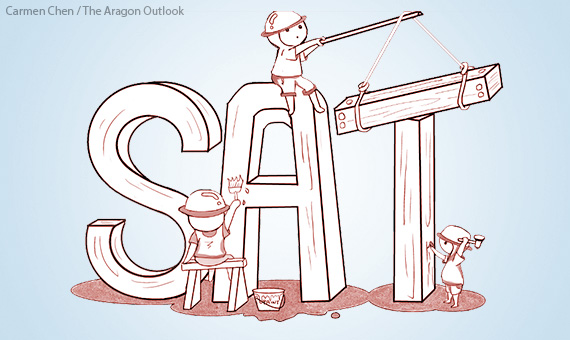
 After several accounts of student impersonations, the College Board has enhanced its security policies for the SAT to prevent students from cheating.
After several accounts of student impersonations, the College Board has enhanced its security policies for the SAT to prevent students from cheating.
In past years, some students have paid young people to take the SAT for them. According to an article by Washington Monthly, Samuel Eshagoff, a college student from Great Neck, New York, impersonated students and took their SAT or ACT exams. He charged up to $2,500 to take a student’s exam. Eshagoff scored 2100 for his own SAT, but scored from 2170 to 2220 for other students’ tests. Eshagoff was charged with impersonation and “falsifying business records.” Although Eshagoff pleaded not guilty, his case led to a further investigation of other possible SAT frauds. Because of this, 20 more students were criminally charged.
Because of these recent incidents, the College Board has decided to implement a stricter security procedure for the SAT.
The most significant changes include providing a recent photo for registration and required presentation of the student’s photo ID multiple times throughout the day: for admission into testing center, before entering a testing room, after breaks, and to collect the answer sheet. Students must sign an agreement stating that they are aware of the consequences of cheating and must also preregister in order to take the test—walk-ins are no longer allowed.
Senior Angela Hung explains, “I think these changes are necessary to prevent more people from cheating, but I’m not sure how effective the new requirements are. I had to add a photo of myself onto the admissions ticket, but people can still easily cheat.”
Students at Aragon are very familiar with the pressure that is placed upon them by the SAT. Hung explains, “I think people get too desperate due to pressure and competition to get into the more selective universities, and all the stress can push people to cheat. A lot of people are tempted to go back to another section on the test—which is cheating—and think they can get away with it when the proctor isn’t paying attention.”
Senior Kelly Walsh agrees, “I’m sure these new changes will help some, but if students are that determined to cheat, they’ll find a way. I think students cheat mainly because there is so much unnecessary pressure for them to do well.”
English teacher Victoria Daniel, who teaches the Summit SAT Prep Course, along with math teacher Adam Jacobs, comments, “Unfortunately, the changes have come out of the unfortunate circumstances of cheating. And yes, I think this is such a competitive time now, and with the technology that allows all these underhand things to go on, unfortunately they are necessary.”
Yet the new rigidity of the security system is not something students look forward to. Hung explains, “I’m totally fine with having the picture on my ticket, but having to check the ID before entering the center, the room and after breaks feels like a huge waste of time. It’s annoying but I’m okay with it.”
Walsh comments, “I don’t really mind complying [with] these new security policies because I’m not going to cheat on the test. They get annoying, especially when you’re already annoyed from being up so early on a Saturday, but I’ll get over it.”
These new rules might seem cumbersome, but cheating in American high schools is not an inconsiderable issue. According to a survey by endtherace. org, out of 240,000 high school students surveyed, 95 percent of them admitted to cheating. However, in a different study, it is said that 2,000 students cheat on the SAT out of the 2 million who take it.
Senior Lindsey Chen says, “Cheating has always been a problem in high schools, but I definitely think there are degrees of harshness in which rules should be implemented and enforced. Some policies are, in my opinion, overdramatic, and students shouldn’t be placed on the academic dishonestly list because they copied a worksheet that they could not finish the night before due to sports or extracurriculars. I agree that when students plagiarize entire paragraphs or on exams, there should be consequences. Overall, I think cheating is a problem in high school, but in varying degrees.”
Hung has some advice for those feeling the stress from testing. “Just chill out! Your SAT score is not worth everything. Students should focus on their passions and not a single standardized test. They should just try their best and whatever happens, happens,” she says.
Having dealt with the new changes to the policy, Hung recounts, “I don’t think it was very different from my past experiences, I thought that it would be a lot more annoying, having to present my ID after leaving the room for a break, but it really wasn’t a big deal. It definitely did not hinder my performance.”




